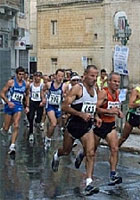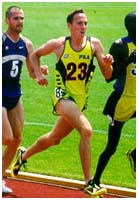 Running Is a Way to Remain Young’ by Paul Grech
Running Is a Way to Remain Young’ by Paul Grech
Unbeknown to most of those taking part in this year’s edition of the St. Patrick’s Birzebbuga 10K in Malta, among them was an athlete who can boast a world record in athletics. For the majority of those athletes, Lynn Hughes was simply the English runner who on the day managed to win the Over 65 category.
Hughes’ achievements, however, are much more remarkable than that. On the 4 th of November 1967 he became the first man to cover the distance of forty miles on a track in less than four hours: 3:58:53.2 to be precise. And although that record has since been surpassed, it is still the fourth best time over the distance.
“I have always enjoyed running,” he said moments after finishing the race. “In all I think that I’ve taken part in around fifty three marathons winning twenty of them. My best time was of two hours and twenty three minutes.”
For someone who was the best in his field, you would expect a high dosage of nostalgia should there be any reason to compare the current and past state of athletics. Not so in Lynn’s case who does such a comparison with refreshing objectivity.
“I think that there is still a healthy interest in athletics. However it is different from our time. It never crossed our minds to get paid for running. For us, athletics was just a way of having fun. Today I don’t think that feeling is still there. That said, today’s athletes are professional and they earn their living from it, so you understand that they take matters more seriously.”
“At the same time I do have my doubts on how they manage to get the energy to obtain certain results.”
Numerous Trips to Malta
Lynn’s visit to Malta was all down to the persistent encouragement of his twin brother Eric, another prolific athlete who was been to the Mediterranean island more than seventy times.
Eric also took part in the Birzebbuga 10K, although for his result wasn’t as satisfying. “I didn’t feel well,” he said. “The heat was too much for me.”
Between the two there is certainly a sibling rivalry, although there is never the danger of it getting out of hand. “We don’t care how the other one does, as long as I finish ahead of him,” says Lynn, only half jokingly.
He doesn’t always manage to do so. A few weeks before coming to Malta, Eric won the 1,500m in the Welsh veteran championships. Lynn finished third on the day when both of them turned sixty-five.
“I enjoy running but it is always a way to remain young.” Few are in a position to contradict Lynn especially as he can still outrun most men thirty years his junior.
Now that he’s had his first taste of road running in Malta, he admitted that he’s thinking of coming back in February for the Malta International Half Marathon. Again, he’ll have the backing of his brother who has taken part on a number of occasions.
If his continuous participation wasn’t enough to confirm his keenness on the event, Eric was more than willing to extol its virtues. “I believe that the Malta Marathon has the potential to attract many more athletes from England. They only have to publicise it a little better. Price wise, I think that there are very few marathons that can compete with Malta. And on an organizational level, it is certainly up there with anything held in England.”
This serves as an indication of how seriously veterans’ athletics are taken. Yet the concept is still relatively in its infancy.
“Veterans’ athletics world wide is immensely popular. We have been trying to build an up to date register of affiliated competitors in Europe, but many affiliates have not supplied us with their membership numbers. However, we can say that the Veteran scene has grown and is growing faster than main stream athletics. We can say that there are over 40.000 known veterans competing in Europe although my guess is that the real figure is a lot higher.”
There are various reasons for this. Health considerations are among the most popular. “Athletics should be a sport for life,” says Bridget Cushen, secretary of the British Veterans Athletics Federation. “To run, to jump, to throw are all natural human instincts. People are now becoming more leisure orientated and more health conscious. It is setting a good example to their children. At an international seminar on obesity held in Switzerland last year, studies showed that children born to physically active sports parents, tend not to be obese. Fit people recover faster after an operation than a non-competitive person, for example.”
But there are other motivations. “Firstly, in many countries people have more leisure time from work. This is where the masters’ and veterans’ scene has grown in all sports,” Thomas explained. “Many people have seen what the older ones are doing in many sports and take up jogging for fun, playing tennis, golf, swimming and so on. In general they get to a stage where they want a bigger challenge and enter an event, and once they see the camaraderie and the feeling that it is not all about competing they carry on training to keep fit and healthy. Many times they travel to national or European competition just to watch and see what the competition is all about. In athletics they try to get a time running, throwing or jumping with others. This is why you will see in many road races up to sixty percent veteran runners, walkers and joggers.”
Malta isn’t an exception as Euchar Grech, chairman of the Veterans’ Committee within the MAAA confirmed. “In Malta, athletes over forty prefer long distance running and road races. I think that we compare well with participation abroad.”
Hardly surprising. Athletics, particularly road races, features among the easiest sports to get into. One starts with a walk in the morning, slowly picking up pace until reaching the point where he’s running comfortable along the roads of his hometown or paths of the local park. And without any pressure to win or of letting team-mates down.
Yet veterans’ athletics isn’t limited to road races. It includes every other track and field event, although with some special considerations. “In athletics we have competitions in 5 year age group, we also have the age grading tables in one and five year age groups, this show what a particular performance is worth at the open age, say when the person was around 26-30 year old, and is based on a percentage of the specific world record. For the running event other than the hurdles there are no allowances, the hurdles height and distances are varied down the age groups. In the Field events the Javelin, Hammer, Discus and shot putt weights are varied down the age groups, these are the main considerations between the age groups.”
Closer to home, track and field events aren’t popular. “We organise many. At every MAAA meet there are events for veterans. But few opt to compete, especially in the advanced age groups,” admits Euchar. “There is a good number of athletes aged between forty and fity. But in other groups there isn’t much comeptition.” That the MAAA took the initiative to set up a committee dedicated specifically to veterans’ athletics highlights the effort to boost this category of the sport.
And they could have hardly chosen a better person to chair this committee. At sixty-six years of age, Euchar – whose sporting career does not only include athletics but also football both as a player and as a coach – is still heavily involved. He’s just come back from a training period in Germany where he also took part in a local championship. His philosophy mirrors a sporting mentality “it is important to remain active. There are physical benefits but also mental ones as sport keeps you very alert. It is equally important to train and not simply compete. One is the result of the other. It is important to train.”
His dedication is typical among many veteran athletes around the globe. Nor is dedication limited to male athletes.
Whereas men of over forty are considered as veterans, for women this is lowered to thirty-five. Cushen explained that it isn’t down to “any physiological or physical reasons, but simple economics. Veteran athletes are not selected to represent their country at veteran World or European Championships. They have to pay all their own expenses. At the first World Championships in Toronto in 1975, it was found that wives tended to be, on average, three years younger than their spouse. They did not wish to sit in the stands watching their 40-year old husband competing, they demanded that a younger age group be formed.”
“Also, in some countries Bye-Laws demand that sports people over a certain age are only allowed to train in a stadium on production of a Medical Certificate. Women who had a break from competitive athletic to raise a family, for instance, found that some doctors were reluctant to issue them a Certificate as they were nearly 40, had three children and were unfit! There was also a very high drop out rate once women had left college or university unless they were of international standard. A wait of over 20 years without the stimuli of competition would prove too much.”
Although most of the participants take up the sport as a hobby, the organisation of events is taken very seriously. If a medal is to be awarded, results have to be within a pre-set standard. This to guarantee a certain level of performance whilst at the same time seeing that the sport gets the respect that it deserves.
Unfortunately, often this is lacking. There is still a patronising attitude towards veterans’ athletics and few appreciate the genuine athletic effort of the participants. Winston Thomas believes that the associations should do more to address this problem. “We – the governing bodies, many affiliations and organisers – are guilty of letting this happen. For example, when a television crew arrives it is very rare that they take and use footage of the younger age groups, they generally go for the older age groups and many time with some thing silly happening, (like hitting a hurdle) It should be that the organisers make some agreement with and broadcaster to show a broad view. In other ways the word “Veterans” also has a patronising tone in many countries, as people do not hear so much about veteran sport and tend to think of the people as old war veterans, this I am afraid still goes on. And this is where governing bodies WMA, EVAA have to also be more active.”
And this, according to Thomas, is one of the most crucial challenges that lie ahead of veterans’ athletics. “For me the next step is to try to overcome the ‘patronisation’ in veterans sport, and getting some investment to aid our members, and this may also mean that we too have to change our name to ‘Masters’, but in doing this we have to make sure that we are in charge of our sport through our affiliated bodies, World Masters Athletics, and the various regions, and that we do not let other bodies dictate and overrun the events, as we see at time with the World Masters Games and possibly any European Masters Games.”
“Ideally, we would like to see veteran athletics become an integral part of all national governing bodies,” says Cushen backing the point raised by Thomas. “Currently many are separate organisations and they do not receive any Government funding.
Hopefully, financial considerations will not stop the progress of veterans’ athletics. And Winston Thomas certainly doesn’t plan to let that happen. “My plans for the next 3 years are to try to establish a Masters European Cup, on the lines of the EAA European Cup, to make sure that the athletes competition entry fees kept as low as possible, and to keep the balance of competitions to a viable amount, and not too many competitions each year.”
























